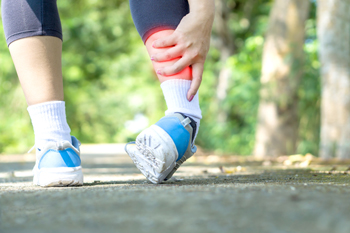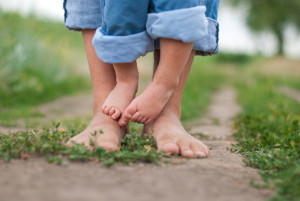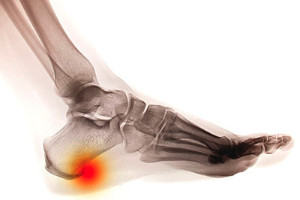September 2019
What Causes Swollen Feet During Pregnancy?
 Many pregnant women often notice that their feet are swollen. Hormone changes can play a significant role in developing swollen feet, in addition to the weight that is gained. Swelling may increase as the due date approaches and may be especially uncomfortable in warmer weather. If the swelling is mild, there’s typically no reason to be concerned. Some pregnant women have found methods that can reduce swelling, such as lying on the left side while sleeping, and drinking plenty of fresh water. It may also help to elevate the feet frequently during the day. Stretching regularly may also be beneficial in reducing swollen ankles and feet. If you would like more information about how to manage swollen feet during pregnancy, speak to your local podiatrist.
Many pregnant women often notice that their feet are swollen. Hormone changes can play a significant role in developing swollen feet, in addition to the weight that is gained. Swelling may increase as the due date approaches and may be especially uncomfortable in warmer weather. If the swelling is mild, there’s typically no reason to be concerned. Some pregnant women have found methods that can reduce swelling, such as lying on the left side while sleeping, and drinking plenty of fresh water. It may also help to elevate the feet frequently during the day. Stretching regularly may also be beneficial in reducing swollen ankles and feet. If you would like more information about how to manage swollen feet during pregnancy, speak to your local podiatrist.
Pregnant women with swollen feet can be treated with a variety of different methods that are readily available. For more information about other cures for swollen feet during pregnancy, consult with one of our podiatrists from CyFair Family Foot Care. Our doctors will attend to all of your foot and ankle needs.
What Foot Problems Can Arise During Pregnancy?
One problem that can occur is overpronation, which occurs when the arch of the foot flattens and tends to roll inward. This can cause pain and discomfort in your heels while you’re walking or even just standing up, trying to support your baby.
Another problem is edema, or swelling in the extremities. This often affects the feet during pregnancy but tends to occur in the later stages.
How Can I Keep My Feet Healthy During Pregnancy?
- Wearing orthotics can provide extra support for the feet and help distribute weight evenly
- Minimize the amount of time spent walking barefoot
- Wear shoes with good arch support
- Wear shoes that allow for good circulation to the feet
- Elevate feet if you experience swelling
- Massage your feet
- Get regular, light exercise, such as walking, to promote blood circulation to the feet
If you have any questions please feel free to contact our office located in Cypress, TX . We offer the newest diagnostic and treatment technologies for all your foot and ankle needs.
Symptoms of an Achilles Tendon Injury
 If you are experiencing pain in the calf and in the back of the heel, you may have what is known as an Achilles tendon injury. This type of injury can produce severe discomfort, and it may be difficult to walk. It is a common ailment among people who enjoy running, and may occur from a lack of stretching the muscles before running or jogging begins. Additionally, it may develop as a result of wearing shoes that do not fit correctly, or from an abrupt change in participating in sporting activities. The Achilles tendon connects the heel to the calf muscles, and if it should become inflamed, Achilles tendinopathy may occur. Some of the symptoms that are associated with this type of injury can include stiffness in the ankle and calf, and the first steps taken after arising in the morning may be uncomfortable. If you have any pain in the heel and the calf, it is strongly suggested that you speak to a podiatrist as quickly as possible who can properly diagnosis and treat an Achilles tendon injury.
If you are experiencing pain in the calf and in the back of the heel, you may have what is known as an Achilles tendon injury. This type of injury can produce severe discomfort, and it may be difficult to walk. It is a common ailment among people who enjoy running, and may occur from a lack of stretching the muscles before running or jogging begins. Additionally, it may develop as a result of wearing shoes that do not fit correctly, or from an abrupt change in participating in sporting activities. The Achilles tendon connects the heel to the calf muscles, and if it should become inflamed, Achilles tendinopathy may occur. Some of the symptoms that are associated with this type of injury can include stiffness in the ankle and calf, and the first steps taken after arising in the morning may be uncomfortable. If you have any pain in the heel and the calf, it is strongly suggested that you speak to a podiatrist as quickly as possible who can properly diagnosis and treat an Achilles tendon injury.
Achilles tendon injuries need immediate attention to avoid future complications. If you have any concerns, contact one of our podiatrists of CyFair Family Foot Care. Our doctors can provide the care you need to keep you pain-free and on your feet.
What Is the Achilles Tendon?
The Achilles tendon is a tendon that connects the lower leg muscles and calf to the heel of the foot. It is the strongest tendon in the human body and is essential for making movement possible. Because this tendon is such an integral part of the body, any injuries to it can create immense difficulties and should immediately be presented to a doctor.
What Are the Symptoms of an Achilles Tendon Injury?
There are various types of injuries that can affect the Achilles tendon. The two most common injuries are Achilles tendinitis and ruptures of the tendon.
Achilles Tendinitis Symptoms
- Inflammation
- Dull to severe pain
- Increased blood flow to the tendon
- Thickening of the tendon
Rupture Symptoms
- Extreme pain and swelling in the foot
- Total immobility
Treatment and Prevention
Achilles tendon injuries are diagnosed by a thorough physical evaluation, which can include an MRI. Treatment involves rest, physical therapy, and in some cases, surgery. However, various preventative measures can be taken to avoid these injuries, such as:
- Thorough stretching of the tendon before and after exercise
- Strengthening exercises like calf raises, squats, leg curls, leg extensions, leg raises, lunges, and leg presses
If you have any questions please feel free to contact our office located in Cypress, TX . We offer the newest diagnostic tools and technology to treat your foot and ankle needs.
Arthritis Can Cause Pain in the Feet and Ankles
Children and Walking Barefoot While Indoors
 Many parents understand the importance of having their toddlers walk barefoot while indoors. This is helpful in strengthening the toes and the top of the feet as they grasp the floor. Additionally, it can promote balance, coordination, and good posture. Research has shown that many babies are born with flat feet, and the arch will generally develop as they are in their teenage years. When children start to walk outside, it is beneficial to have their feet properly measured, and this is helpful in determining the correct size shoe. When the first shoes are purchased, it is important to ensure there is adequate room for the toes to move freely in. If you notice your child walks with their feet pointed inward or outward, it is suggested that you schedule a consultation with a podiatrist who can properly monitor any foot condition.
Many parents understand the importance of having their toddlers walk barefoot while indoors. This is helpful in strengthening the toes and the top of the feet as they grasp the floor. Additionally, it can promote balance, coordination, and good posture. Research has shown that many babies are born with flat feet, and the arch will generally develop as they are in their teenage years. When children start to walk outside, it is beneficial to have their feet properly measured, and this is helpful in determining the correct size shoe. When the first shoes are purchased, it is important to ensure there is adequate room for the toes to move freely in. If you notice your child walks with their feet pointed inward or outward, it is suggested that you schedule a consultation with a podiatrist who can properly monitor any foot condition.
The health of a child’s feet is vital to their overall well-being. If you have any questions regarding foot health, contact one of our podiatrists of CyFair Family Foot Care. Our doctors can provide the care you need to keep you pain-free and on your feet.
Tips for Keeping Children's Feet Healthy
- Make sure their shoes fit properly
- Look for any signs of in-toeing or out-toeing
- Check to see if they have Clubfoot (condition that affects your child’s foot and ankle, twisting the heel and toes inward) which is one of the most common nonmajor birth defects.
- Lightly cover your baby’s feet (Tight covers may keep your baby from moving their feet freely, and could prevent normal development)
- Allow your toddler to go shoeless (Shoes can be restricting for a young child’s foot)
- Cut toenails straight across to avoid ingrown toenails
- Keep your child’s foot clean and dry
- Cover cuts and scrapes. Wash any scratches with soap and water and cover them with a bandage until they’ve healed.
If you have any questions, please feel free to contact our office located in Cypress, TX . We offer the newest diagnostic and treatment technologies for all your foot care needs.
What Causes Heel Spurs?
 The condition that is known as a heel spur can cause pain and discomfort. It happens as a result of a calcium deposit that forms between the arch and the heel of the foot. The symptoms that are often associated with this condition can include difficulty in walking barefoot, pain in the heel and surrounding areas, and swelling and inflammation. It can develop with muscle and ligament tension, which may cause the soft tissues to wear out. People who frequently participate in sporting activities that involve running and jumping may be prone to developing heel spurs. It is beneficial to wear shoes that have adequate cushioning in the heel area, in addition to resting and elevating the foot as often as possible. If you have developed a heel spur, it is advised that you speak to a podiatrist who can recommend treatment options that are correct for you.
The condition that is known as a heel spur can cause pain and discomfort. It happens as a result of a calcium deposit that forms between the arch and the heel of the foot. The symptoms that are often associated with this condition can include difficulty in walking barefoot, pain in the heel and surrounding areas, and swelling and inflammation. It can develop with muscle and ligament tension, which may cause the soft tissues to wear out. People who frequently participate in sporting activities that involve running and jumping may be prone to developing heel spurs. It is beneficial to wear shoes that have adequate cushioning in the heel area, in addition to resting and elevating the foot as often as possible. If you have developed a heel spur, it is advised that you speak to a podiatrist who can recommend treatment options that are correct for you.
Heel spurs can be incredibly painful and sometimes may make you unable to participate in physical activities. To get medical care for your heel spurs, contact one of our podiatrists from CyFair Family Foot Care. Our doctors will do everything possible to treat your condition.
Heels Spurs
Heel spurs are formed by calcium deposits on the back of the foot where the heel is. This can also be caused by small fragments of bone breaking off one section of the foot, attaching onto the back of the foot. Heel spurs can also be bone growth on the back of the foot and may grow in the direction of the arch of the foot.
Older individuals usually suffer from heel spurs and pain sometimes intensifies with age. One of the main condition's spurs are related to is plantar fasciitis.
Pain
The pain associated with spurs is often because of weight placed on the feet. When someone is walking, their entire weight is concentrated on the feet. Bone spurs then have the tendency to affect other bones and tissues around the foot. As the pain continues, the feet will become tender and sensitive over time.
Treatments
There are many ways to treat heel spurs. If one is suffering from heel spurs in conjunction with pain, there are several methods for healing. Medication, surgery, and herbal care are some options.
If you have any questions feel free to contact our office located in Cypress, TX . We offer the latest in diagnostic and treatment technology to meet your needs.
Methods That May Diminish the Chances of Falling
 Research has indicated that individuals who are sixty-five years or older commonly fall, which can result in physical injuries. If falling has occurred, elderly people may become fearful of performing daily activities. This can lead to becoming inactive, and depression may occur. There are methods that can be implemented which may help to diminish the risk of falling. These can include having regular vision tests performed, and modifying the home environment by installing grab bars in the bathroom area. Additionally, it is beneficial to remove existing rugs that are loose, and it is helpful to have medications reviewed. If you would like additional information about how falling can affect the feet, it is suggested that you speak with a podiatrist.
Research has indicated that individuals who are sixty-five years or older commonly fall, which can result in physical injuries. If falling has occurred, elderly people may become fearful of performing daily activities. This can lead to becoming inactive, and depression may occur. There are methods that can be implemented which may help to diminish the risk of falling. These can include having regular vision tests performed, and modifying the home environment by installing grab bars in the bathroom area. Additionally, it is beneficial to remove existing rugs that are loose, and it is helpful to have medications reviewed. If you would like additional information about how falling can affect the feet, it is suggested that you speak with a podiatrist.
Preventing falls among the elderly is very important. If you are older and have fallen or fear that you are prone to falling, consult with one of our podiatrists from CyFair Family Foot Care. Our doctors will assess your condition and provide you with quality advice and care.
Every 11 seconds, an elderly American is being treated in an emergency room for a fall related injury. Falls are the leading cause of head and hip injuries for those 65 and older. Due to decreases in strength, balance, senses, and lack of awareness, elderly persons are very susceptible to falling. Thankfully, there are a number of things older persons can do to prevent falls.
How to Prevent Falls
Some effective methods that older persons can do to prevent falls include:
- Enrolling in strength and balance exercise program to increase balance and strength
- Periodically having your sight and hearing checked
- Discuss any medications you have with a doctor to see if it increases the risk of falling
- Clearing the house of falling hazards and installing devices like grab bars and railings
- Utilizing a walker or cane
- Wearing shoes that provide good support and cushioning
- Talking to family members about falling and increasing awareness
Falling can be a traumatic and embarrassing experience for elderly persons; this can make them less willing to leave the house, and less willing to talk to someone about their fears of falling. Doing such things, however, will increase the likelihood of tripping or losing one’s balance. Knowing the causes of falling and how to prevent them is the best way to mitigate the risk of serious injury.
If you have any questions, please feel free to contact our office located in Cypress, TX . We offer the newest diagnostic and treatment technologies for all your foot care needs.








